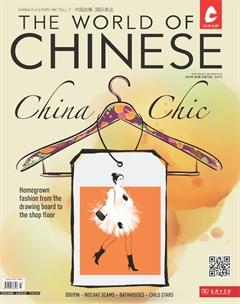装?适度关心外表,不要失去本真
黄伟嘉 谭云飞
In his ballad “Flowers and Jade Trees in the Back Courtyard,” Chen Shubao, the corrupt last emperor of the Northern and Southern dynasties (420 – 589), boasted that his concubines “new garments and good looks could fell a city” (新装艳质本倾城). But according to folk wisdom, the clothing (装, zhu`ng) played a bigger role than the person. As expressed by the Chinese proverb, “[Appearance is] 30 percent looks and 70 percent adornment” (三分靠长相,七分靠打扮).
The character 装 , the key to beauty, gets its pronunciation from the radical 壮 (zhu3ng, strong) at the top, and its meaning from 衣 (y~, clothing) below. The character originally referred to packed luggage, and this meaning has remained in several idioms, including 轻装上阵 (q~ngzhu`ng sh3ngzh-n, “go into battle with light baggage”), meaning to approach a task without mental burdens, and 整装待发 (zh0ngzhu`ng d3if`, “all packed and ready to go”). 裝 can also refer to other packing-related actions, such as 装车 (zhu`ngch8, “load a truck”) or 装满 (zhu`ngm2n, “fill up”).
Later, 装s definition was extended to clothing—baggage one outfits oneself with in daily life. Phrases with 装 in the suffix are abundant in the fashion industry, describing various types of clothing such as 军装 (j$nzhu`ng, military uniform), 童装 (t5ngzhu`ng, childrens wear), 泳装 (y6ngzhu`ng, swimwear), and 时装 (sh!zhu`ng, trendy clothing). Outlandish get-ups that dont conform to any fashion norms are called 奇装异服 (q!zhu`ng y#f%).
Besides the clothes themselves, the act of dressing up is also referred to with the character 装, as in 装扮新娘 (zhu`ngb3n x~nni1ng, “dressing up the bride”), and 为了抓住罪犯,警察化装成一个乞丐 (W-i le zhu`zh& zu#f3n, j@ngch1 hu3zhu`ng ch9ng y! g- q@g3i, “In order to arrest the criminal, the policeman disguised himself as a beggar”). Its not just humans that require decking out, either: 装修 (zhu`ngxi$, renovate) and 装点 (zhu`ngdi2n, decorate) refer to outfitting ones house for habitation; 安装 (`nzhu`ng) means to install or assemble an object, such as 安装电话 (`nzhu`ng di3nhu3, “install a telephone”).
Although theres still a divide between menswear and womens fashion, cross-dressing is an ancient and surprisingly respected tradition in performing arts. In Peking opera, for example, female lead roles, known asdan, were traditionally played by men, as women were forbidden from learning the art. The four greatestdanperformers of the 20th century—Mei Lanfang, Shang Xiaoyun, Cheng Yanqiu, and Xun Huisheng—were all men who convincingly masqueraded (化装, hu3zhu`ng ) as heroines using makeup and 戏装 (x#zhu3ng, stage costumes).
Compared with 男扮女装 (n1n b3n n)zhu`ng, men in drag), 女扮男装 (n) b3n n1nzhu`ng, women in a mens disguises) were less common, but did play a key role in the plot of two classic folk tales. Hua Mulan, the military heroine of a self-titled ballad of the Northern and Southern dynasties, who disguised herself as a man and takes up 武装 (w^zhu`ng, arms) in her elderly fathers stead. Her story was the basis of the 1998 Disney animated movieMulanand its upcoming live-action adaptation.
In the Eastern Jin tale “The Butterfly Lovers,” meanwhile, Zhu Yingtai disguises herself as a man to study in an academy in Hangzhou, eventually becoming star-crossed lovers with her male classmate Liang Shanbo. At first, Zhu 假装 (ji2zhu`ng, pretends) to set Liang up with her “sister.”
装 can apply to not only covering up physical appearance, but also feelings and fact. It can work as a verb by itself—as in 他装出很爱我的样子 (T` zhu`ngch$ h0n 3i w6 de y3ngzi, “He pretended to love me deeply”)—or describe specific pretenses, such as 装糊涂 (zhu`ng h%tu, “playing dumb”), or 装腔作势 (zhu`ngqi`ng zu7sh#, “putting on airs of importance”).
Not all pretense is immoral, and sometimes its necessary to dress up the truth. A well-known story tells how Warring States strategist Sun Bin, author ofThe Art of War, had to 裝疯卖傻 (zhu`ngf8ng m3ish2, “feign madness and act like an idiot”) to save his life. Due to his genius, Sun was framed for treason by a jealous ex-schoolmate, General Pang Juan of the State of Wei, and had his legs chopped off at the knee as punishment. Sun then pretended to be mad—talking nonsense, living in a pigsty, and eating manure—to avoid further persecution until he could flee to the State of Qi, eventually helping it defeat the Wei.
Salespeople also know the value of 装: Just as good-looking people are more popular, products sell better with clever 包装 (b`ozhu`ng, packaging). For this meaning, 装 can be coupled with different containers, such as 瓶装 (p!ngzhu`ng, “bottled”) and 盒装 (h9zhu`ng, “box-packed”).
Of course, its unwise to focus on the decoration while overlooking the essentials—as indicated by the fate of Chen Shubao, who was reduced to hiding in a well from the conquering Sui dynasty and died an alcoholic in the Sui capital. On the other hand, its necessary for people to take good care of their appearance. As another proverb cautions, 人靠衣装,佛靠金装 (R9n k3o y~zhu`ng, f5 k3o j~nzhu`ng. “People rely on their clothes, just as Buddha relies on gold plating to shine”).

